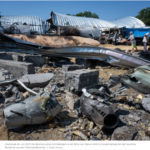Velina Tchakarova was quoted by BNE Intelligence. “Ever since Russia’s emergence as a significant player on the world stage, underscored by its military interventions in Georgia (2008), Ukraine (2014), and Syria (2015), it has been re-establishing old Soviet channels of influence in Africa as part of a strategy for vertical geopolitical expansion spanning the Arctic, Eurasia, the South Caucasus, the Middle East, and increasingly Africa”, geopolitical analyst Velina Tchakarova said in a tweet. “Russia signed military cooperation agreements with several Sahel countries, including Chad, Niger, and Nigeria in August 2017; Guinea in April 2018; Burkina Faso in August 2018; and Mali in June 2019. And the Sahel region has been particularly unstable with over half a dozen coups in just the past three years. Niger’s strategic importance has grown exponentially for several reasons. Firstly, the country boasts vast uranium reserves. Secondly, France, the US, and Russia are actively involved in counterterrorism efforts in the region. Thirdly, Turkey and the UAE view Niger as a crucial player in their ongoing rivalry in Libya. In 2021, Russia worked to promote anti-French narratives in Africa and boost its soft power in Mali, the CAR, and Niger at France’s expense. Russian President Vladimir Putin followed up this campaign, hosting the second Russia-Africa summit in St Petersburg at the end of July that was attended by almost all the African countries, although most heads of state were pressured by the US to stay away. With Mali and Chad under military rule, Niger has become an increasingly crucial part of the US and France’s Sahel strategies, but the coup suggests the Western powers are losing the battle for influence in the region.”





